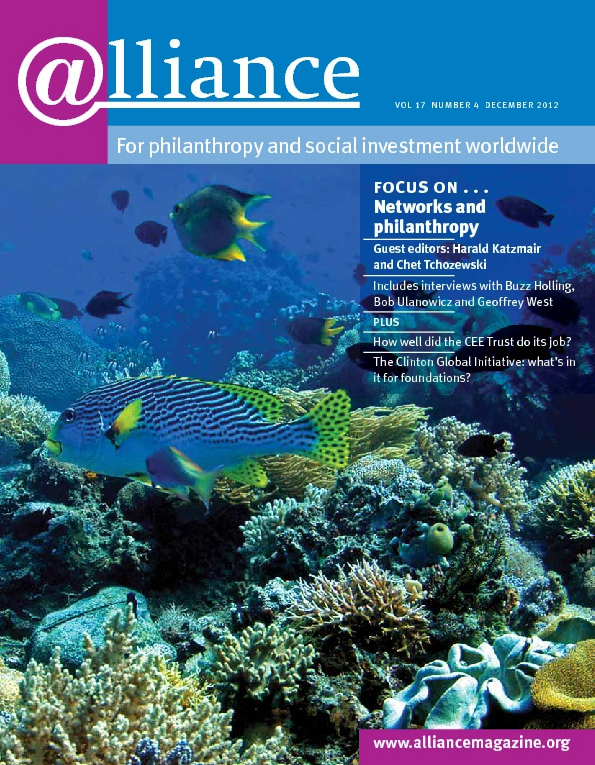Networking is seen as the apple pie in development … everyone says it’s good and organizations are urged to do it, regardless of what categories of association or organization they are part of. In development, I see networks coming about for a variety of reasons. None of these are good or bad in themselves, but the way organizations enter into these arrangements influences the impact and values of the associations that are produced through the networking.
When government or grantmakers seek to create ‘networks’, there are both advantages and disadvantages. In almost all instances, these are linked to the nature of the relationship between the state or grantmaker and those it is urging to form the network. Often, NGOs in the South feel compelled to participate in networking events because they see it as linked to getting resources; this produces inequality and the value of the association is reduced. In some bizarre instances, NGOs compete with each other to look better in the eyes of the grant giver. In other instances, under the guise of networking, NGOs are commissioned or contracted by grantmakers to take on projects or activities and given instructions collectively.
SDI (Shack/Slum Dwellers International) is a transnational organization whose affiliates are national federations of the urban poor living in slums and informal settlements who come together for the sake of strength, solidarity and learning from each other. For us, networking helps build the capacity of individuals and federations and increases their ability to connect with others both within their own city or country and internationally. Associating with a wider range of actors in turn helps to expand the possible choices that development can offer to the urban poor.
Internally, much of SDI’s work with national leadership is to build capacity and confidence:
- To engage both membership and peer organizations within the country and internationally to learn from each other about creating a critical mass of voices to seek change.
- To explore relationships with other forms of association, such as organizations of mayors, or networks of donors or ministers, to explore possibilities of collaboration and joint ventures that can benefit their constituency.
- To examine the different approaches of other global organizations in order to learn how to refine our own work.
To be effective, networking requires clarity of intent. Why is an individual or organization exploring these relationships? Do they know what they want from the interaction? Sustaining relationships that facilitate networking is important. If a group or individual is looking only for resources, the relationship is one-sided and the interest of others in the network will rarely be sustained. SDI is fortunate to have many relationships with grantmakers, both formal and informal, that may have begun for the purpose of funding but have since expanded to include exchange of ideas, knowledge and support and working together to explore new possibilities.
An example: just last week, I was invited to speak at a conference of the Association of African Planners (AAP) in Nairobi. Fifty schools of planning in 14 countries came together a few years ago and began to explore the new challenges that cities have to face and the consequent changes that planning education needs to explore. Through the interaction of the planning school at Cape Town University with the South African affiliate of SDI and a similar arrangement in Nairobi between the university and the Kenyan affiliate, SDI and AAP signed an MOU to examine how both sets of organizations could work together to produce outcomes that work both for them and for African cities more widely.
Together, they sought funds from the Rockefeller Foundation to finance six studios, three of which have been completed, in cities with a local school and a federation affiliated to SDI. The aim is to examine how these processes can influence the curriculum of the local planning school. The early results of the first three will inform and hopefully enhance what the next three studios can do. Together we have begun to examine who else can be involved, and we plan to explore whether UCLGA (the organization of mayors in Africa) will see value in participating in this association.
Such explorations require a number of things: the capacity to engage and explore; clarity of focus; the capacity to co-produce solutions and strategies that would be impossible for any of the organizations involved to do alone; and expanding one’s capabilities to engage the others and learn from and influence them. Finally, and most important, they require a collaborative spirit which is both generous in sharing ideas and strategies and in sharing influence and resources.
Sheela Patel is director of SPARC and chair of SDI. Email sparcssns@gmail.com



Comments (0)